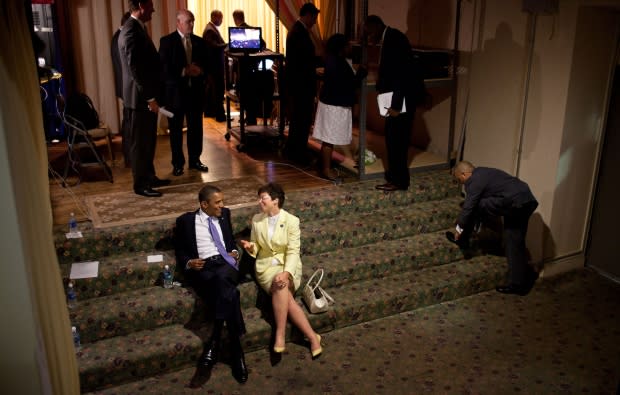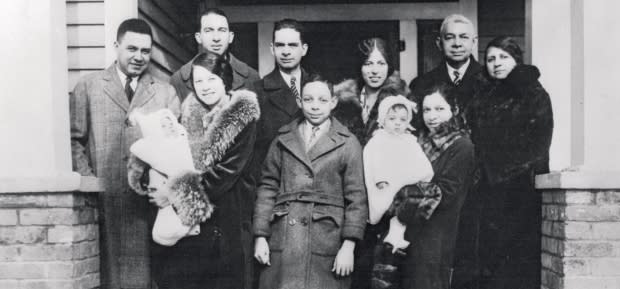Obama senior adviser Valerie Jarrett offers an intimate look behind the scenes of his presidency
Digging through the archives of photographs from Barack Obama's time in the White House, one can't help but notice her.
In practically every photo, from every important moment through the course of his campaigning and presidency, Valerie Jarrett is not far from Obama's side.
Hers was a trusted voice as Obama reckoned with some of the most pivotal moments of his political career.
Indeed, she has been his friend, confidant and mentor for nearly three decades. From his time as a community organizer in Chicago, to the moment he announced his candidacy for president of the United States, to perhaps the most critical moment of that 2008 campaign — the Jeremiah Wright controversy — she was there.

Best hire ever
Jarrett's relationship with the Obamas goes back to 1991, when a young lawyer named Michelle Robinson approached her for a job. At the time, Jarrett was chief of staff for Chicago Mayor Richard Daley.
"She walks in for a job interview. She's tall and elegant and simply dressed, hair pulled back, barely any makeup on," says Jarrett.
"And she sits down, she sees her resumé sitting on my desk and she never mentions a word. No Princeton, Harvard, big law firm. She tells me her story — growing up in a working-class family, a father who had a very humble job working for the city but instilled in her the sense of the value of education for both she and her brother. And how her parents sacrificed mightily for them to get the education that they had. And in return they said, 'to those whom much is given, much is expected.'
"And it was a story that just kind of blew me away."
Jarrett says she offered her a job on the spot, but Robinson needed time to think about it — and then came a catch.
Who's your fiancé? And why do we care what he thinks? - Valerie Jarrett
"A couple of days later I said, 'well?' And she said, 'bad news, my fiancé doesn't think it's such a good idea.' And I was like, 'Who's your fiancé? And why do we care what he thinks?'
"And she said, 'his name is Barack Obama. He started his career as a community organizer. Would you have dinner with us to talk about it?,'" Jarrett says.
"Am I glad I said yes!"
From that moment on, after the now-famous dinner in Chicago, Barack, Michelle and Valerie were a team. Michelle Robinson joined Jarrett at the mayor's office and the three friends began an extraordinary journey.
Reckoning with race
Jarrett says the close bond between them gave her a unique advantage in her job as Barack Obama's senior adviser.
"When we were having dinner, I knew what was weighing on his mind," says Jarrett of times she spent with Obama through his presidency. "And so I think I was hopefully able to be more supportive because I knew what he was going through during the day."
One of her most memorable moments came in 2008. With his first presidential campaign on the line and faced with mounting criticism over the searing sermons of his pastor, reverend Jeremiah Wright, Obama called his senior team together to talk about how to address the issue.
Jarrett, one of two black staffers on the team, says she encouraged him to tackle the issue head on.
"Everyone else on the senior team either stayed silent or expressed grave reservations," says Jarrett.
In the end, Obama heeded Jarrett's advice and responded with his now-famous speech on March 18, 2008, in Philadelphia about race and politics, which was titled "A more perfect union."
Just minutes before the speech, Jarrett says Obama was relaxed backstage, casually chatting about basketball with his legal adviser, Eric Holder.
But it was a make-or-break moment, and when he stepped onstage to speak, Barack Obama seized it.
In her book, Finding My Voice, Jarrett goes on to say that, "the promise of his campaign, his very purpose, didn't transcend race, but necessarily reckoned with it."
Jarrett adds that Obama was determined to create a place where people who had traditionally felt disconnected from each other could find a common bond.
Family history
When asked if, back in the early days of their relationship, she thought Barack Obama would ever end up in the oval office, Jarrett can't help but smile.
"I thought he could win. And actually when he did win, my mother asked me the question 'how did you know that he could?,' because neither of my parents thought he had a chance, based on their life experience. In their lifetime would there be a black president? No.
"And I said to them, 'you raised me to think that if you work twice as hard, anything is possible.' And then they said, 'well we didn't really believe that!,'" laughs Jarrett. "But I realized that they had raised me aspirationally, not as the world that they knew but as the world they hoped I would find. And that's, I think, the best gift you can give your children."
That upbringing, along with the inspiration of her remarkable family history, helped Jarrett become one of the most influential black women of the 21st century.
"My grandmother, who was the matriarch of her family, had photographs of our ancestors throughout her home, and when I wasn't running around playing I was looking at them," Jarrett says.

"I would listen to her tell stories about them, and one that really resonated with me was my great-grandfather, Robert Robinson Taylor, who grew up in Wilmington, North Carolina."
His father had been born into slavery and was freed after the Civil War, becoming a carpenter. He cobbled together enough money to send his son, Jarrett's great-grandfather, to the Massachusetts Institute of Technology.
Robert Robinson Taylor went on to become MIT's first black graduate, and the first black accredited architect in American history.
"He was the first African-American to go to MIT," Jarrett says. "I often wonder what that train ride was like, from Wilmington to Boston, and how was he embraced by his fellow classmates, who had probably never been around a black person socially or academically before.
"And so whenever I get nervous about something, I think about him."
Her grandfather, Robert Rochon Taylor, was a distinguished civic leader and became the first African-American chairman of the Chicago Housing Authority. The city later named a series of housing projects in his honour — what would become the infamous Robert Taylor Homes that were the antithesis of his visionary approach to housing. Decades later, Jarrett laid groundwork that led to their demolition, beginning in 1998.
Jarrett's father, Dr. James Bowman, had a remarkable career as well. He became a world-renowned pathologist and geneticist, but only after moving the family to Iran because it presented more opportunities for black doctors than America did at the time.
Nobody looked at me as black. And so in a lot of ways I think it gave me a sense of confidence. - Valerie Jarrett
"My father really faced challenges, when he was coming out of the Army, finding a job in the United States," says Jarrett.
"He was considered a black doctor or a Negro doctor [in America] back then. And in Iran he was an American doctor, respected based on the merit of his work. And since I was born there and lived on a hospital compound with children from all over the world, nobody looked at me as black. And so in a lot of ways I think it gave me a sense of confidence."
When Jarrett was six, her father moved the family back to Chicago, where he became the first African-American resident at St. Luke's Hospital.
Whether talking about her family history or her own career, the issue of race is the thread that runs through Jarrett's extraordinary story.
Most recently, in June of 2018, Jarrett recalls a conversation she had with her mother who was fuming over a racist tweet directed at her daughter. She doesn't mention her by name, but Valerie Jarrett does give her thoughts on the now-infamous tweet aimed at her that devastated Roseanne Barr's career.
In her book, Jarrett says the tweet prompted a long conversation with her mother about the current climate in the U.S. with regard to race relations.
"We began with far too many young people of colour still growing up painfully aware that they are not being judged on their merits, but, rather, stigmatized by their race, and what that does to their spirit and ambition," Jarrett explains.
"My mother was particularly concerned that, after our country had taken what she had considered an impossible leap forward by twice electing a black man as our president, it felt like we were now quickly regressing."
Jarrett says they were both stunned by how rapidly the Trump administration was unravelling many of the Obama-era policies they had fought for.

Even today, more than two years after Donald Trump became president, Jarrett is still struggling to deal with America's decision to put him in the White House.
"The word I've used is soul-crushing," says Jarrett. "I didn't see it coming, and I spent a lot of time after the election trying to figure out how could a country that elected Barack Obama twice, elect his successor?
"It's painful because I think about the families that are being impacted by these changes — whether it's walking away from the climate accord, or the Iran deal, or the policies on immigration that are separating families at the border. It's been very painful to watch. Not to mention the impact that it's having on families, not just in America but around the world, who have always looked to the United States to be that beacon of hope and democracy."
Best Obama moment
When put on the spot to come up with her favourite Obama story, Jarrett smiles and says, "I have so many, but I couldn't tell you most of them!"
Still, when Jarrett thinks back on her time in the White House and the countless hours spent with President Obama, she doesn't reflect on a particular moment, but an unshakable bond between her two closest friends.
Watch the interview with Valerie Jarrett from The National:

